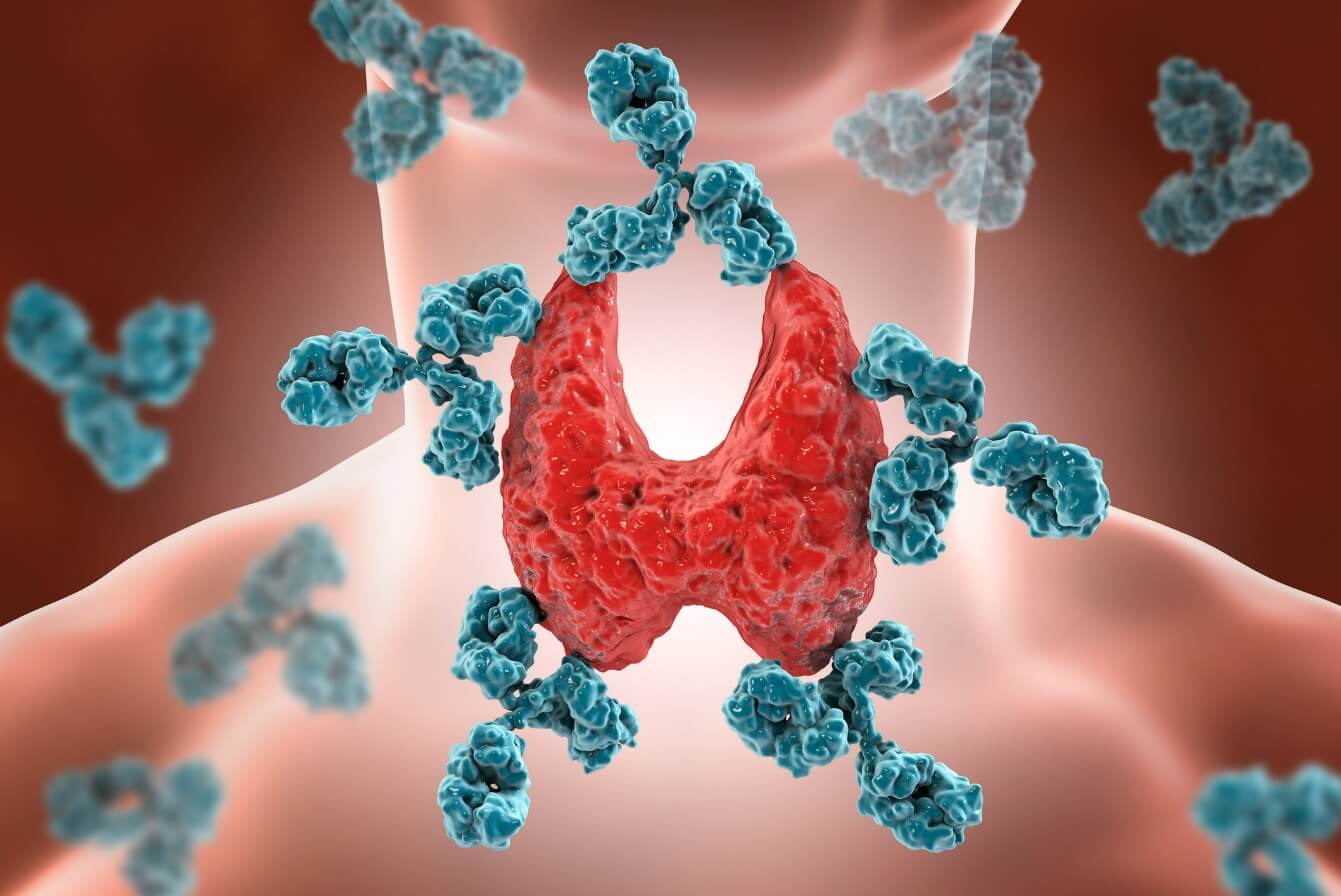Tireoidite de Hashimoto: sintomas, diagnóstico e tratamento
Hilab | 27 out 2021

A tireoide é uma glândula localizada na região do pescoço, responsável pela produção e liberação dos hormônios T3 e T4, que auxiliam no metabolismo do organismo.
Se houver baixa disponibilidade desses hormônios, o corpo tentará aumentar a atividade da tireoide liberando um outro hormônio que a estimula, o TSH produzido pela glândula hipófise. Essa condição, com T3 e T4 baixos e TSH alto, é chamada de hipotireoidismo.
Dentre as causas que podem alterar o funcionamento da tireoide e ocasionar o hipotireoidismo, a mais comum é a Tireoidite de Hashimoto.
Continue a leitura para entender o que é a Tireoidite de Hashimoto, quais os sintomas e como é feito o diagnóstico e tratamento da doença.
O que é a Tireoidite de Hashimoto?
A Tireoidite de Hashimoto, também chamada de tireoidite linfocítica crônica, é a principal causa do hipotireoidismo. É uma doença autoimune na qual anticorpos do nosso corpo atacam e destroem células da tireoide por não reconhecê-las como próprias, causando inflamação crônica e podendo evoluir para uma redução da atividade da glândula e dano tecidual.
Ainda não se sabe o que causa essa produção de anticorpos contra a própria glândula da tireoide, mas existem alguns fatores de risco para o desenvolvimento da síndrome.
Quais os fatores de risco da doença de Hashimoto?
A incidência desta doença é 5 a 8 vezes maior em mulheres do que em homens e pode afetar, até mesmo, crianças a partir dos 6 anos de idade. Alguns fatores de risco contribuem com o surgimento da doença:
- Mulheres acima de 40 anos;
- Predisposição genética por histórico familiar da doença;
- Pessoas com anomalias cromossômicas como síndrome de Down, síndrome de Turner e síndrome de Klinefelter;
- Infecção por vírus ou bactéria;
- Outras alterações endócrinas como diabetes tipo 1, problemas na glândula adrenal, artrite reumatoide, entre outras.
Outro fator de risco é o excesso de iodo na alimentação. Apesar da falta de ingestão de iodo ser uma das causas do desenvolvimento do hipotireoidismo, seu consumo em excesso pode desenvolver a Tireoidite de Hashimoto. Por isso é importante equilibrar a alimentação!
Quais são os sintomas da Tireoidite de Hashimoto?
Os sintomas da Tireoidite de Hashimoto costumam aparecer quando ela evolui para um quadro de hipotireoidismo, e os sinais podem ser muito sutis nos primeiros meses e até anos da doença.
Os sintomas iniciais incluem:
- fadiga;
- ganho de peso;
- pele seca e fria;
- prisão de ventre.
Com o avanço da doença, outros sintomas mais característicos podem aparecer, como:
- rouquidão e pressão no pescoço devido ao aumento da tireoide (o que conhecemos como bócio);
- depressão, demência e outros distúrbios psiquiátricos;
- perda de memória;
- intolerância ao frio;
- perda de cabelo;
- inchaço ao redor dos olhos;
- diminuição dos batimentos cardíacos;
- pressão arterial elevada;
- lentificação da fala;
- falta de coordenação de movimentos musculares voluntários e de equilíbrio;
- dor nas articulações e câimbras musculares;
- menstruação irregular;
- diminuição da libido;
- sonolência e apneia durante o sono.
Como é feito o diagnóstico?

Quando existe a suspeita da doença, a confirmação do hipotireoidismo pode ser feita através de exames laboratoriais para detecção de níveis de TSH e T4 livre. Em casos em que a tireoide está com alterações, o resultado desses exames deverá indicar TSH alto e T4 livre baixo.
Já para confirmar a existência da Tireoidite de Hashimoto, é solicitado um exame de detecção e quantificação de autoanticorpos tireoidianos, conhecidos como anti-TPO e anti-TG.
Outros exames complementares podem ser feitos para avaliar o funcionamento do metabolismo e a condição da glândula tireoide, como o hemograma completo, perfil lipídico, creatinina, prolactina e ultrassonografia.
Como é feito o tratamento?
O tratamento da Tireoidite de Hashimoto é igual ao de outras causas de hipotireoidismo, com o uso de reposição hormonal de T4.
O fármaco usado é a levotiroxina sódica, administrada via oral todos os dias em jejum, normalmente para o resto da vida do paciente, já que se trata de uma doença crônica. O acompanhamento com um endocrinologista é fundamental para a dosagem dos níveis de hormônios e ajustes no tratamento.
Outro tratamento, a intervenção cirúrgica, é indicado em alguns casos específicos. A presença de bócio volumoso, com sintomas obstrutivos, como dificuldade para respirar ou engolir, e a existência de nódulo maligno ou linfoma de tireoide sugerem a necessidade da cirurgia, conhecida como tireoidectomia.
Em casos assintomáticos de Tireoidite de Hashimoto, ela é classificada como subclínica, e não é preciso realizar tratamento.
Uma doença crônica que exige cuidados
A Tireoidite de Hashimoto, quando causa sintomas e alterações nos hormônios tireoidianos, exige cuidados e disciplina por parte do paciente. O tratamento é contínuo e seu endocrinologista precisa acompanhar sua evolução para evitar complicações e ajustar a medicação.
Uma Tireoidite de Hashimoto não tratada pode gerar complicações como problemas cardíacos e mentais, e inclusive o câncer de tireoide.
Dê atenção aos sinais do seu corpo e consulte um endocrinologista em caso de suspeita. Se você achou esse conteúdo útil, confira outros textos sobre saúde disponíveis no blog da Hilab!
Referências
LEE, S. L. Hashimoto Thyroiditis. Medscape. Disponível em: <https://emedicine.medscape.com/article/120937/>. Acesso em: 27 de outubro de 2021.

Hilab
Somos especialistas em Point-of-Care Testing. Criamos dispositivos para exames PoCT, realizados com apenas algumas gotas de sangue e resultados entregues em poucos minutos. Nosso propósito é democratizar o acesso à saúde.

Deixe um comentário